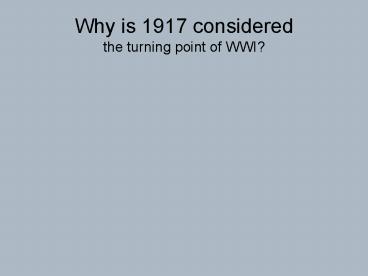Why is 1917 considered the turning point of WWI? - PowerPoint PPT Presentation
1 / 22
Title: Why is 1917 considered the turning point of WWI?
1
Why is 1917 considered the turning point of WWI?
2
- Autocracy, Orthodoxy and Nationalism
3
- There were two revolutions in 1917
- The February (March-western calendar)
- The October (November)
4
The November 6th Revolution
- The second revolution was instigated and inspired
by a radical socialist party then known as the
Bolsheviks. Its leader was Vladimir Lenin.
5
How did the Russian army perform when war broke
out?
6
(No Transcript)
7
(No Transcript)
8
(No Transcript)
9
(No Transcript)
10
- Czar Nicholas II's government ended in 1917 when
both soldiers and civilians united after riots on
food lines broke out
11
.
- The Provisional government of Alexander
Kerensky continued the war .. big mistake that
led to his undoing - The greatest challenge to his authority came
from the Bolsheviks
12
- Founder of the Bolshevik Party which was
outlawed in Russia.
13
Location of Bolshevik Leaders in February, 1917 Location of Bolshevik Leaders in February, 1917
Bolshevik Leaders Location
Lenin Switzerland
Radek Switzerland
Zinoviev Switzerland
Bukharin New York
Litvinov London
Antonov-Ovseenko Paris
Dzerzhinsky Moscow
Latsis Petrograd
Molotov Petrograd
Kirov Vladikavkaz
Stalin Kureika (Siberia)
Ordzhonikidze Pokrovsk (Siberia)
Sverdlov Turukhansk (Siberia)
Kamenev Achinsk (Siberia)
Rykov Narym (Siberia)
14
(No Transcript)
15
Upon returning to Russia, What did Lenin promised?
16
The Treaty of Brest-Litovsk, March 1918
- Why might this be called a bad treaty of Russia?
- Why did Lenin sign it?
17
- Woodrow Wilsons
- Proclamation of Neutrality
18
Allied propaganda
- Americans felt a kinship with the British and
friendship with France since the American
Revolution
19
What changed for Americans?
- German unrestricted submarine warfare
- attacked ships of neutral nations without warning
and without attempting to save the crew and
passengers - May 7, 1915 The Lusitania 128 Americans died
20
American economic interests
- American agricultural and manufactured goods were
sold almost exclusively to the Allies. - American investors extended substantial loans to
the Allies
21
American idealism
- a war to end all wars - Woodrow Wilson
- the world must be made safe for democracy -
Woodrow Wilson - The March Revolution in Russia a Provisional
government with strong democratic tendencies.
22
April 6, 1917 America goes to war
- The formal end to neutrality came when Congress
passed a formal declaration of war - Wilson offered a peace plan The Fourteen Points
- It took about a year for the U.S. to recruit,
train, supply and transport a modern army to
Europe
23
Significance of American entrance into the war
- Broke sharply with Americas traditional
avoidance of foreign entanglements the policy
of isolation George Washington - Turned the tide of battle in favor of the Allies
- Americas emergence as a world power and
eventually a world leader
24
Hostility towards Germany
- Autocratic Kaiser William
- Invasion of neutral Belgium
- Allied propaganda
- Economic interests
- American idealism
- The Lusitania
- Contd submarine warfare
- The Zimmerman telegram
25
- Any questions?































